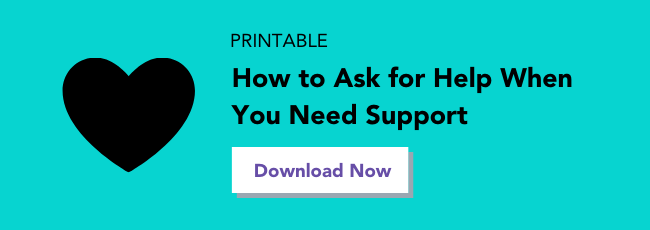How to Ask for Help When You're in a Mental Health Crisis
 Content warning: Suicide
Content warning: Suicide
We live in a society that encourages people to ask for help but stigmatizes mental illness.
A society that encourages self-care in the form of yoga and meditation and going outside but shames people for taking medication to help manage the chemical imbalances in their brain.
A society that says “it’s okay not to be okay” but says that people who talk about mental illness are doing it for attention.
The mental healthcare system is broken. Plain and simple. But the society and culture we live in (at least in the United States) don’t help things either. We see posts on social media that say “I’d rather listen to your story than attend your funeral” – and then the next post that follows says that people who talk about mental illness, self-harm, substance use, thoughts of suicide, etc. are only doing it for attention.
To those who’ve never experienced mental illness or battled with their mental health, it may not seem like much. But it’s those conflicting messages that make it difficult for people to seek help.
And when you do have the courage and strength to ask for help, what do you even say?
Truth is, up until a few months ago, I had no idea how to ask for help in a mental health crisis. I have all the crisis hotlines as contacts on my phone, and I know which friends and coworkers I can count on. But as for what to say...I was lost. And as it turns out, I’m not the only one.
So I put together this list.
How to ask for help when you're in a mental health crisis
This list isn't exhaustive by any means, but it’s a starting point. Whether you’re having a bad day, struggling with some intense feelings, have been experiencing a depressive episode for a while or you’re fighting through a crisis, here are some ways you can ask for help when you need extra support:
(Note: If you’re having suicidal thoughts or are thinking about hurting yourself or someone else, please call 911 or visit your nearest emergency room immediately. Your life matters, and we want you to get the help you need to make it through these moments.)
1. I’m struggling with my mental health, and all the coping skills I know aren’t working. Can you help me come up with some other ideas?
Even if you have a list of tried-and-true coping strategies, there may come a time when those skills don’t work for you. Maybe the list you have needs a refresh or the coping skills you know aren’t designed for the crisis you’re currently in. It happens. We’ve all been there.
When reaching out for help, let the person you’re talking to know that you have a list of coping strategies but they’re not working for you right now and that coming up with some new skills would be beneficial. Many crisis lines have a long list of resources they can send to you, but don’t be discouraged if none of them feel helpful or realistic for you at that moment.
Instead, take a step back and think about:
- What’s worked well for me in the past?
- What are some things I’m really good at?
- What are some things that bring me joy?
- What puts a smile on my face?
- What helps distract me – even when I’m not in a crisis?
- What on this list could I combine with some of the ideas above?
Then work with the crisis line to brainstorm some ideas that you feel will work for you. Give a few a try. If they don’t work, try others. The key is to keep working through the list you’ve created because you will find something that sticks.
Pro Tip: Save that list! You never know when it might come in handy again.
2. I’m feeling incredibly [stressed, anxious, overwhelmed, depressed, suicidal, etc.] right now. I don’t know exactly what to say or what I need, but I don’t want to be alone.
I’m writing this post as we’re in the middle of the COVID-19 pandemic, and I almost left this one out, but then I realized that even if we can’t be with someone physically, we can still show support by being there emotionally – and with the help of technology.
(Plus – for what it’s worth – none of my closest friends/support system live in the same city or state as I do, and yet this is still something I’ve said when reaching out for help.)
The reality of being in a mental health crisis – or just having a tough day – is that we often feel a ton of emotions all at once, which can make it difficult to know what to say, what we need or how someone can support us through this moment. But we know what we don’t need...and that’s being alone.
When you’re in this position, reach out to a crisis line or to a friend, let them know some of the emotions you’re feeling (if you can identify them) and let them know you don’t want to be alone right now. Maybe that looks like texting or FaceTiming with a friend while you talk about everything and nothing all at the same time. Maybe it means calling, texting or messaging a crisis line so they can help you identify your emotions and think about some coping skills.
You don’t need to know exactly what you need to ask for support. The most important thing is that you reach out and work with someone to figure out what will be most helpful at that moment.
3. I’m having a rough day/night, but I’m not ready to talk about it. Can you help distract me by talking about [insert topic here]?
If you’re having a tough time but aren’t ready to talk about what’s going on (or you don’t know how to), it’s okay. There’s no timeline for how or when you need to talk about it – if you ever talk about it at all.
While it’s often helpful to talk about painful situations with a friend, therapist or support group so you’re not bottling up your emotions or holding onto them alone, there will also be times when you’re not a place to talk about it or when it’s not the best way to cope.
But you still need something – and maybe that “something” is talking about a topic completely unrelated to what you’re going through.
Don’t know what to talk about? Here are some ideas:
- Dogs, cats or other pets
- Shows you’re currently binge-watching
- A movie you recently watched
- Your workout program
- A funny video you found on YouTube or TikTok
- Classes you’re taking (if you’re in school)
- Something funny that happened to you
- A time you embarrassed yourself
- That time you were chased by a giant bird in the middle of Boston...oh wait, that only happened to me? Bostonians, tell me I’m not alone.
It sounds weird, but being able to share that story with someone even when I was in the middle of a crisis actually made me feel better. Not “I’m not depressed anymore” better – but better enough that I no longer had feelings of hurting myself. And with many types of therapy, the goal in a crisis isn’t to make things better; it’s simply to prevent things from getting worse.
4. Could you send me pictures of you [dog, cat, pet, etc.] or tell me a funny story to distract me from what I’m feeling?
 Few things make me happier than seeing pictures of dogs (and I think many others would agree). Although a close second is funny stories that my friends share – especially when it’s something they’ve actually done. Yes, I enjoy hearing stories of my friends being awkward, doing something hilarious or finding themselves in a less-than-pleasant situation (like my bird encounter in the section above).
Few things make me happier than seeing pictures of dogs (and I think many others would agree). Although a close second is funny stories that my friends share – especially when it’s something they’ve actually done. Yes, I enjoy hearing stories of my friends being awkward, doing something hilarious or finding themselves in a less-than-pleasant situation (like my bird encounter in the section above).
I know it’s hard to feel (or want to feel) joy when you’re in such a low place, but give it a shot. This one might just surprise you – and bring a smile to your face.
5. I know we haven’t talked in a while, but I trust you and was wondering if we could just talk.
We all lose contact with close friends at one point or another. But speaking from experience, they never stop thinking about you just like you never stop thinking about them.
If you’re worried that they’ll feel like you’re just using them, I promise that the person you’re reaching out to would rather sit and listen to your story than attend your funeral – no matter how long it’s been.
6. Will you check-in with me [this weekend, in a couple of days, on a specific date, etc.] to make sure I’m okay and/or hold me accountable?
This is a tough one if you have a mental illness, are going through a tough time and/or are in a crisis because you likely already feel like a burden to those around you. And asking someone to do a quick check-in on you – even just once – might make you feel like more of a burden.
Another secret for you: You’re not a burden, and no one who loves you is going to say no if you ask them to check in on you.
The truth is, the people who love you and care about you would rather check-in with you every single day and know that you’re okay instead of waking up one morning to find out that you took your own life.
I know it’s hard to believe – and trust me when I say that I struggle to believe it sometimes – but if there’s anything I’ve learned from being in (what feels like) a never-ending crisis this past year it’s that people truly, genuinely care. And they will do whatever they can to support you...check-ins included.
7. I don’t want to be alone right now. Could you stay on the phone (or FaceTime) with me until I feel a little better?
 Another tough one if you feel like a burden, but remember what I said above: You are not a burden. So many people love you and will do absolutely anything they can to support you.
Another tough one if you feel like a burden, but remember what I said above: You are not a burden. So many people love you and will do absolutely anything they can to support you.
When using this strategy, combine it with one of the others in this post so that it’s not awkward silence for both of you (although sometimes, sitting with someone else in silence is incredibly comforting and isn’t awkward at all).
Not up to talking about your feelings? Talk about something else happening. Ask your friend to share what’s new in their life. Reminisce on old memories, laugh about inside jokes, share funny videos. Do something to fill the time until you’re comfortable and safe enough to hang up the phone.
8. [If you work with a therapist] I’m having a really hard time and was wondering if you had availability for another session this week? I could use the extra support right now.
Before going to therapy twice a week, I found that I often needed extra support. While I didn’t use this strategy often, when I did, it was always worth it. Although there were times my therapist couldn’t squeeze me in (and still can’t), we always found an alternative – like a quick phone check-in to help get me to a more stable place until our next session.
Depending on your therapist’s schedule (along with your insurance), they may or may not be available for an additional session in a given week. And the disappointment of hearing “sorry, I don’t have any availability” after you made yourself super vulnerable by asking for extra support can be overwhelming. I know because I’ve been there.
But I’ve always asked myself, “Is hearing ‘no’ worse than not asking at all? And what happens if they say ‘yes,’ and I get that extra session?”
Ultimately, you have to weigh the costs and benefits of reaching out to your therapist and asking for an additional session. If you feel like being told “no” will send you further into a spiral, consider reaching out to a crisis line instead. Many of them are 24/7 and can provide you unlimited support when you need it.
If you feel comfortable, though, I’d highly recommend reaching out to your therapist to see what their availability looks like. And to take it a step further, consider talking to your therapist about meeting more than once a week on an ongoing basis.
Truthfully, going to therapy twice a week has been life-changing for me, and I can’t imagine going back to meeting once a week.
9. I need help
When you don’t know what to say or when all else fails, simply saying “I need help” is more than enough. It’s the easiest way to let people know that you’re hurting and you need help. And your support system or a crisis line will take those words seriously.
If you’re speaking with someone on a crisis line, they’ll ask you questions to better understand your situation and how they can help you. More likely than not, they’ll ask you if you’re having thoughts of suicide or hurting yourself. They’ll ask if you have a plan. Be honest with them; they’re asking these questions because they care and want to help you.
Even if you’re not thinking of ending your life, these questions help to gauge your situation and figure out what the next best steps might look like and what level of support you need.
If you don’t get what you need from a crisis line, try another one. Call or text a friend. Reach out to your local emergency services or crisis intervention team. Keep reaching out and asking for help until you get what you need. Not everyone will know the right thing to say, but believe me when I tell you that they want to help. Give people a chance to help you.
Because I promise you that there’s someone in this world – whether it’s your best friend, an acquaintance from college, a coworker, your manager, your brother or sister, your parents, your therapist, even a crisis hotline volunteer – who wants you to stay.
So please, don’t stop reaching out for help until you find that person.
If you're having a hard time finding support or having thoughts of hurt yourself, please go to the emergency room so you can get the help you need and keep yourself safe in the process. Your life is worth it.
Final thoughts
Reaching out for help when you’re going through a really tough time or you’re in the middle of a crisis is so freakin’ hard. I actually think it’s one of the hardest things to do because at that moment, all you want is to be alone. But it’s also incredibly brave.
It takes a lot of courage to pick up the phone, send a text or email your therapist. It takes strength to admit that you’re not okay and you can’t do it on your own. It takes a lot of reminding that it’s okay to not be okay and there’s no shame in asking for help. So here I am, reminding you of those things.
By taking the extra step to reach out for help and support, you’re showing yourself and the world that you’re not giving up. And that, my friend, makes you a strong, brave, badass warrior and a force to be reckoned with.
The world is better because you’re in it. Please never forget that.
Note: These are just suggestions, and I encourage you to make these your own – whatever that might look like. Mix and match phrases from these statements to come up with something that feels true to you and your situation (and who you’re talking to). Add something I may not have included. Do whatever you need to do with these so that you feel comfortable and safe reaching out for help in a mental health crisis.
Want these tips in an easy-to-access printout? Click the image below to download your free copy!



